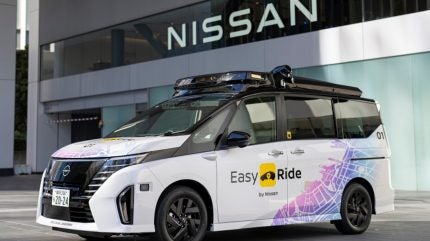
Nissan Motor has conducted a public road test of a driverless vehicle in Yokohama’s Minato Mirai area, marking a first for Japan.
The test featured a vehicle operating without a driver in a complex urban environment, demonstrating Nissan’s “proprietary technology” designed for a future mobility service launch in the country.

Discover B2B Marketing That Performs
Combine business intelligence and editorial excellence to reach engaged professionals across 36 leading media platforms.
The technology aims to address transportation challenges, including those caused by an ageing population.
The company aims to establish and ensure the safety of autonomous-drive (AD) technology, which is tailored to different traffic conditions worldwide.
Developed based on Nissan’s Serena minivan, the test vehicles are equipped with nine radars, 14 cameras, and six LiDAR sensors to enhance recognition and decision-making capabilities.
The elevated positioning of these sensors on the vehicle’s roof improves the detection capabilities and accuracy of the surroundings, Nissan said in a press release.
The integration of AI has advanced the vehicle’s ability to recognise and predict behaviours, make judgments, and control operations smoothly in diverse and complex driving scenarios.
To ensure safety during the demonstration, Nissan engineers verified numerous potential scenarios along the route, implemented an emergency stop function, and ensured intentional redundancies in the system.
Looking ahead, the company plans to carry out service demonstration tests with around 20 vehicles in Yokohama during the fiscal years 2025 to 2026.
These efforts are aimed at establishing an operational framework and service ecosystem in collaboration with various stakeholders.
Nissan plans to leverage the test results to provide autonomous driving mobility services, supported by remote monitoring, in fiscal year 2027.
This initiative is being promoted in close cooperation with Japan’s Ministry of Economy, Trade and Industry, the Ministry of Land, Infrastructure, Transport and Tourism, other government ministries, and Yokohama City.
Last month, Nissan reaffirmed its commitment to vehicle production in Thailand, easing concerns about its global restructuring plans.






